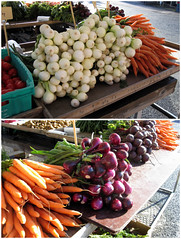Living a healthy life includes a balance of regular exercise, taking care of your body and healthy eating. With so many different products out there now, it’s sometimes challenging to know what’s truly healthy and what’s a fraud. One food group you can know for certain is a healthy option is vegetables. If you’re looking to get the most out of eating healthy, make sure the following vegetables are part of your diet.
Beets
While earthy and subtly sweet, beets do indeed have the highest sugar content of any vegetable. On the other hand, beets are still low in calories, packed with fiber and rich in iron. Additionally, these vegetables are loaded with heart-healthy folic acid and the cancer-fighting antioxidant beta-carotene. Many people who choose to eat beets cut off the top leafs, which can be compared to Swiss chard. Believe it or not, these leafy greens that many of us throw out are actually more nutritious than the roots of the beet, with double the potassium, folic acid, calcium and iron.
Carrots
Carrots can be used in many ways, from desserts like carrot cake to a great snack with hummus. Aside from being slightly sweet and having a great crunch, carrots contain more carotenoids that any other veggie. Carotenoids is the antioxidant that gives carrots their yellow-orange pigment and may protect against certain types of cancer, heart disease and cataracts.
The beta-carotene in carrots is converted by the body into vitamin A which is an essential vitamin for healthy skin and a strong immune system. Additionally, carrots contain soluble fiber, vitamin C and bone-strengthening calcium.
Kale
Kale has recently grown in popularity with new, inventive ways to cook and eat this nutritious vegetable. Kale is an incredible source of vitamins A, B6 and C, along with fiber, iron and calcium. In all actuality, kale is one of the healthiest greens you can eat.
Kale contains more vitamin K than broccoli, spinach and Swiss chard. Kale also contains high levels of lutein and zeaxanthin, two powerful phytochemicals that may help safeguard the eyes from conditions such as macular degeneration and cataracts.
Brussels Sprouts
These small and leafy vegetables may not look like much, but they’re packed with nutrients that benefit the heart, boost the immune system and they even promote healthy skin. Being a member of the phytochemical-heavy cruciferous family, brussels sprouts are packed with healthy gluscosinolates which are thought to fight cancer.
Research has shown that eating these baby cabbages could possibly reduce the risk of premenopausal breast cancer. If that isn’t enough of a reason to love these little vegetables, they’re also full of vitamin A, C and folate.
Sweet Potatoes
Sweet potatoes are truly incredible vegetables. Similar to carrots, these bright colored potatoes are packed with beta-carotene and are good for vision, prevents certain types of cancer and boosts immunity. Sweet potatoes are low in calories, high in fiber and great for weight loss. They also contain high levels of folate, vitamins B6, C and E. Talk about a healthy potato! It doesn’t get any healthier than this.
Shiitake Mushrooms
Mushrooms in general are well known for their health benefits, but in particular, shiitake mushrooms really make a statement. They offer a lot in terms of fiber and protein, and also contain some iron, potassium and zinc, a vitamin which helps to keep the body’s immune system and boosts neurological function.
These vegetables may be some of the best for you, but there are many more out there that also have amazing health benefits. When it comes down to it, vegetables are full of vitamins and minerals that you really can’t get naturally from anything else. If you’re looking to live a long and healthy lifestyle, make sure your diet includes hefty portions of vegetables.
Marissa Bruce is a freelance writer and health activist. She studied health and nutrition before deciding to take her education a step further. She is now researching online nursing masters degree programs.
